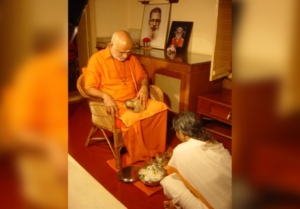Ashram Diary
Intensity in spiritual seeking
Ma Gurupriya

Nutan Swamiji asked, “Will you tell us why you are saying this? What is the reason for which you did not progress, or attain the supreme Goal, in spite of having all opportunities?”
The Swamiji kept quiet for a while, and then replied, “Lack of intensity! I lacked intensity in my seeking.”
Ma Gurupriya shares a valuable lesson learnt from a visiting ascetic. Sannyāsins come to the Ashram from various parts of India. Most of them stay for a short while – at most 3 or 4 days – during their wandering mission. Many of them come from North India, who speak Hindi only. How they come to know about our small Ashram on the slope of Pandavagiri Hill in this remote Venginissery village, is a mystery!
This aged sannyāsin had arrived the previous day. He had a pleasant personality and looked quite bright. After dinner, Poojya Swamiji had asked everyone to listen to the narration of this visitor Sannyāsin about his 52 years of sannyāsa life.
As we took our seats, the visitor Swamiji, aged about 78, started speaking. He was a disciple of Swami Sivananda Maharaj, founder of Divine Life Society, Rishikesh. After staying in Rishikesh and Uttarkashi for many years, he had shifted to his own Ashram in a village called Shahjahanpur in U.P. He spoke highly about the people of U.P. who are generally given to sādhu-seva (serving the saints). There, a sādhu will never go without food. If a sādhu takes shelter in the village, somebody or other will definitely bring bhiksha for him.
The Swamiji said, when he went to Shahjahanpur, people arranged his stay in a hermitage on a plot of land which they had offered earlier to a sādhu, who had subsequently left. Slowly the villagers made a small ashram for him on their own accord. He had been staying there for many years now spending time on his sādhanā and scriptural studies. After some time, a brahmacharin came to assist him. The villagers used to bring him food.
We too had heard about sādhu-preeti (love for ascetics) in Uttar Pradesh villages. In Uttarakhand we have seen children running behind sannyasins to do praṇām (prostration). How rich is the culture of this poor land! Only in our country such things happen. Whether rich or poor, even now people have great regard for those who have renounced worldly life and embraced spiritual seeking. And, this culture is all the more pronounced in villages – not only in UP, but in MP, Gujarat and other places too.
In the autobiography of Swami Akhandananda (disciple of Sri Ramakrishna Dev), I had read that once while wandering he had taken shelter in a village near Narmada river. It was evening. He was given a place to sleep and was given good food. Next morning, by the time he woke up, everybody had gone out for work. When they returned in the evening, Swami Akhandananda asked them as to how they could leave the house, keeping him, a complete stranger, inside? One could even have robbed their articles and gone while they were away!
Great was their reply: “Maharaj, it has happened earlier that a stranger sādhu whom we had given shelter had thieved and gone. A sādhu’s dharma is to pursue righteousness and Truth. He should not deviate from it. Similarly, for grihasthas (householders), the dharma is to serve the sādhus. Just because some sādhus are not good, we cannot deviate from our dharma.”
This had happened at the end of the 19th century. Recently, we heard a similar incident from a sannyāsin who came to our Ashram. He too spoke about the deep devotional nature of people and their sense of service to the sannyāsins and Mahatmas. He had come across such good people while he did Narmada-parikrama (going around the Narmada river).
Such is our country! When I think of these poor villagers, our numerous countrymen suffering from poverty even after so many years of Independence, I get a lump in my throat, my eyes get moist and there is heaviness in my heart. I wonder whether my feelings are deep enough! For, do I really do much for them? In the same manner, when I hear such incidents, I feel proud of them for upholding our rich culture, in spite of their being economically very poor.
As the visitor Swamiji continued his engrossing narration, we too felt transported to Rishikesh and Uttarakashi. He spoke about how he had gone from Kerala to Rishikesh at a very young age, how he took sannyāsa from Swami Sivananda Maharaj, how he went to Tapovan Maharaj to study the scriptures, how subsequently he went to Kailash Ashram and studied under Swami Vishnudevananda Giri Maharaj and Swami Harihar Tirtha Maharaj.
He described the Ganga in Uttarakashi and the Ganga in Rishikesh. He told us how he had lived eating dal and roti from the satras (free food distribution centres for the renunciates), how he suffered from diarrhea and became extremely weak. He described his days of madhukara vrtti (going for food from door to door) and then the subsequent days of ajagara vrtti (remaining seated in one’s own place and eating whatever Providence brings).
As the Swamiji spoke about his life of renunciation, austerity and spiritual studies under different Sadgurus, my mind went back by many years. I could recollect the sight of Rishikesh and Uttarkashi vividly. I could feel strongly that air of austerity and renunciation which pervaded every corner in those places. How I was impressed by that atmosphere when I stayed there, how I was influenced by that life of vairāgya – a life away from all worldliness, wholesomely dedicated to spiritual seeking and attainment! I was not a sannyāsin then; nor did I know that I would become one in years to come. I remembered how restless my mind was at that time, craving to become a wholesome spiritual seeker.
Like turning the pages of an album, as the Swamiji spoke, I remembered many incidents and experiences that helped me reach the stage where I am now.
And then the Swamiji said, “When I began speaking to you, I mentioned that my life is a tragedy. I say this because, in spite of having the best of opportunities, teachers and Gurus, and in spite of doing all kinds of austerities and sādhanā, I feel I am as far from my spiritual goal as I was when I started.”
His words made us thunderstruck. For a moment the whole assembly was stunned. Breaking the silence, Nutan Swamiji asked, “Will you tell us why you are saying this? What is the reason for which you did not progress, or attain the supreme Goal, in spite of having all opportunities?”
The Swamiji kept quiet for a while, and then replied, “Lack of intensity! I lacked intensity in my seeking.”
Then he turned towards the brahmacharins and resumed his talk, “You all have left your homes, and have taken refuge under the feet of your Guru, pursuing spiritual path. I am telling you the story of my life as a caution so that you are careful, and do not make mistakes. Children! Without intensity in your spiritual seeking, you will not be able to reach the goal.”
It was quite late and time for all to disperse. I went to my room, thinking about what the Swamiji said. I wondered what exactly he meant by “lack of intensity”. He left the next day. However, his revealing narration remained in the mind, and quite often I would reflect over it.
A person who has done a great deal of austerities and is well-versed in scriptures, who has had the opportunity to learn at the feet of several realized Gurus, who has remained in this ascetic life with steadfastness for more than five decades – will not such a person have ample intensity? Then, what is that insufficiency in the mind because of which he feels unfulfilled? It was very hard to believe what he told us about his spiritual progress. Moreover, he looked so bright and poised! This whole episode reminded me of the shloka from the Upanishads:
नायमात्मा प्रवचनेन लभ्यो न मेधया न बहुना श्रुतेन ।
यमेवैष वृणुते तेन लभ्यस्तस्यैष आत्मा विवृणुते तनूँ स्वाम्
nāyamātmā pravacanena labhyo na medhayā na bahunā śrutena |
yamevaiṣa vṛṇute tena labhyastasyaiṣa ātmā vivṛṇute tanūm̐ svām
Kaṭhopanishad 1.2.23/ Muṇḍakopanishad 3.2.3
However much one is given to deep analysis of scriptures, however intelligent one may be, or, however much he has listened to the scriptures, the Self reveals itself only to him who wholesomely yearns for It.
I also remembered another Śloka from Muṇḍakopanishad:
नायमात्मा बलहीनेन लभ्यो न च प्रमादात्तपसो वाप्यलिङ्गात् ।
एतैरुपायैर्यतते यस्तु विद्वांस्तस्यैष आत्मा विशते ब्रह्मधाम ॥ ४ ॥
nāyamātmā balahīnena labhyo na ca pramādāttapaso vāpyaliṅgāt |
etairupāyairyatate yastu vidvāṃstasyaiṣa ātmā viśate brahmadhāma || 4 ||
Muṇḍakopanishad 3.2.4
The Self cannot be attained by one who is weak-minded, who is inattentive or who practices improper austerities. Self is attained by that wise man who strives with vigour and attention following the Upanishadic instructions. Such a one experiences union with Brahman.
Through his life story, the Swamiji indirectly pointed out that even if one is a brahmacharin or a sannyāsin who has renounced everything in life – even if one has undergone various austerities and learnt the scriptures, seeking the Self or God or Brahman – there is every possibility that the intensity in seeking can dwindle, hindering spiritual progress and fulfillment! But, why does the mind lose its intensity?
During one of the subsequent days I asked our Swamiji, “Swamiji, what did the sannyāsin mean by saying that he did not progress even a bit because of lack of intensity in seeking? What is this lack of intensity?”
Swamiji replied, “Not having one-pointedness in seeking the Truth. Giving importance to various desires, and not giving Brahman the supreme position in life.
“Is it not true that even after embracing spiritual path wholesomely, a sannyāsin’s or brahmacharin’s mind gets tainted by jealousy or desire for recognition? Even the ego of renunciation taints the mind. Obsession with austerities or study of scriptures makes one drift from the single goal of purifying the mind, which must culminate in the realization of the Self, bestowing absolute freedom. What great and wholesome alertness is needed in this path to remove such obstacles!”
I noticed Poojya Swamiji was quite absorbed in his thoughts. After sometime he said: “Śankaracharya has spoken about the reason for not being able to attain Brahman:
समाधौ क्रियमाणे तु विघ्नान्यायान्ति वै बलात् ।
अनुसन्धानराहित्यमालस्यं भोगलालसम् ॥ 127॥
लयस्तमश्च विक्षेपो रसास्वादश्च शून्यता ।
एवं यद्विघ्नबाहुल्यं त्याज्यं ब्रह्मविदा शनैः ॥ 128॥
Aparokṣānubhūtiḥ 127, 128
To one intending to have samādhī, obstacles intrude forcefully. They are: lack of enquiry, idleness, desire for sensory pleasures, sleep, dullness, distraction, tasting of joy, and sense of emptiness. One desiring the Knowledge of Brahman should gradually get rid of such innumerable obstacles.”
Poojya Swamiji was particularly mentioning about ‘anusandhāna-rāhityam’ (lack of enquiry). It happens when the seeker becomes complacent about his sādhanā, and stops enquiring further. He does not investigate as to why there is no progress; why the mind does not attain that unaffected, imperishable Brahman which is beyond all pairs of opposites and all guṇās; why the mind is not able to transcend dehātma-bodha (identification of body with Self) to have Brahmātmaikatva-bodha (identity of Self and Brahman). The seeker must reflect upon the impurities of the mind, which hinder the mind from one-pointed seeking and steadfastness in the path.
Poojya Swamiji was humming to himself another Śloka:
प्रज्ञावानपि पण्डितोऽपि चतुरोऽप्यत्यन्तसूक्ष्मात्मदृग्
व्यालीढस्तमसा न वेत्ति बहुधा संबोधितोऽपि स्फुटम् ।
भ्रान्त्यारोपितमेव साधु कलयत्यालम्बते तद्गुणान्
हन्तासौ प्रबला दुरन्ततमसः शक्तिर्महत्यावृतिः ॥
Vivekacūḍāmaṇiḥ 114
A wise and learned man, even if he is clever, and has gained vision of the exceedingly subtle Atman, gets overpowered by tamas and does not get the doubtless Knowledge of the Atman. Gripped by delusion he considers as real that which is not. How powerful is the great āvṛti śakti (the power of veiling the Truth) of the dreadful tamas!
Every day so many things happen. Throughout the day, a seeker has to learn from his interactions. There is no end to learning. The words – the warning and the kindly given caution – of the aged sannyāsin, who had lived a 52-year-long sannyāsa-life remain etched in my mind.
– From Vicharasethu
Throughout the day, a seeker has to learn from his interactions. There is no end to learning.
Children! Without intensity in your spiritual seeking, you will not be able to reach the goal.
 508 views
508 views

 Add to Favorites
Add to Favorites Add to Reading List
Add to Reading List









